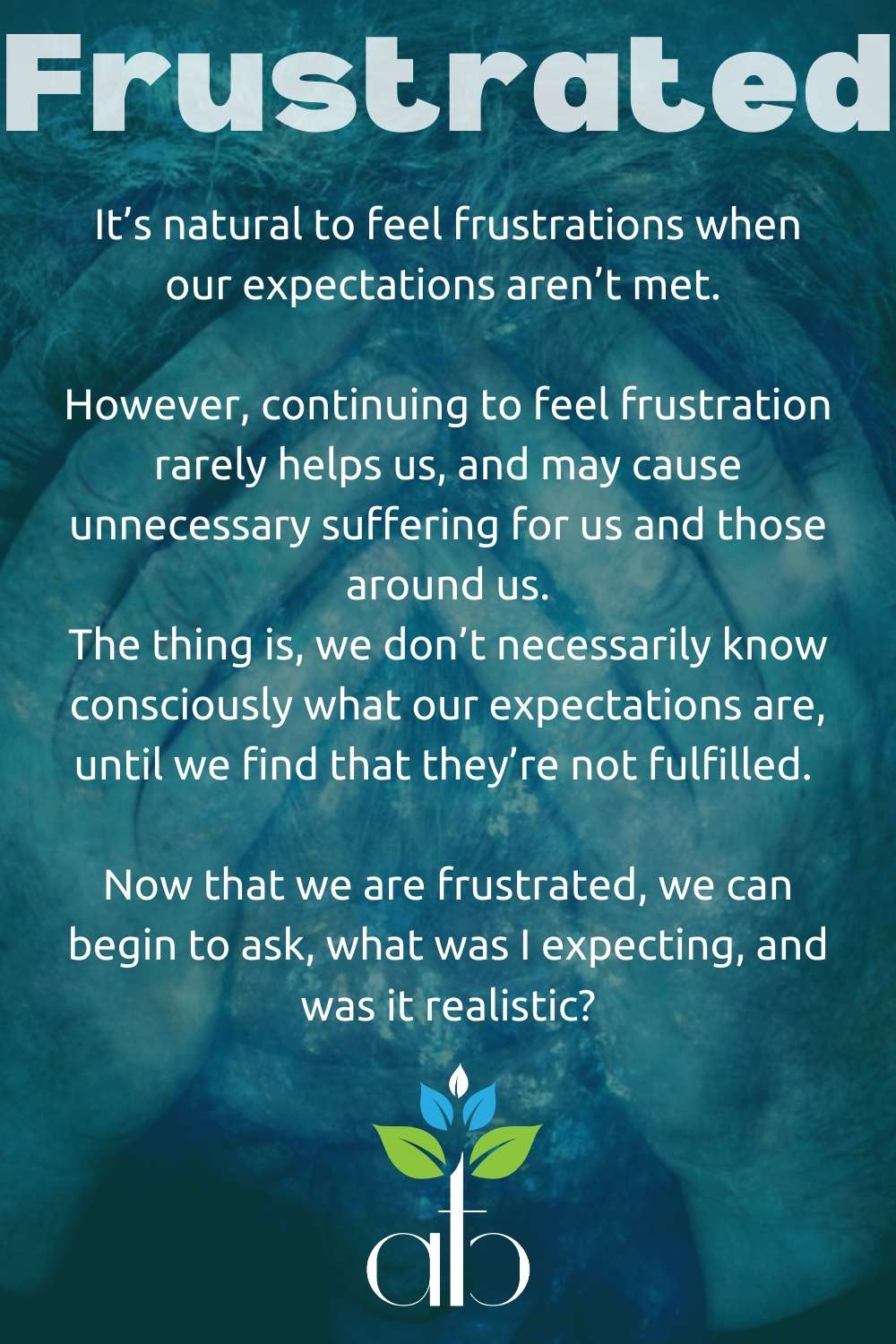Episode 75
Why We Get Frustrated

It’s natural to feel frustrations when our expectations aren’t met. However, continuing to feel frustration rarely helps us, and may cause unnecessary suffering for us and those around us.
The thing is, we don’t necessarily know consciously what our expectations are, until we find that they’re not fulfilled. Now that we are frustrated, we can begin to ask, what was I expecting, and was it realistic?
We might expect that people will understand us the first time we explain a concept. On the surface, that seems reasonable.
Looking a little deeper, we can find out that people normally will not understand a new concept the first time it’s explained, because they’re not used to thinking that way. In fact, that is the challenge of the good communicator – to say things in a way that others understand them.
We started with the belief and expectation that “People should understand me whenever I explain things,” and it led to frustration. Now we can hold onto the more realistic belief: “People will not always grasp a concept the first time I explain it,” and it leads to greater patience.
Hosts & Guests
Kurt Robinson
Transcript
I’d like to talk to you about why we get frustrated.
I was thinking about this today. This is funny. I told my friend Luis the other day that sometimes I get frustrated with people and it’s a problem for me.
And Luis says “Well, you’ve always been patient with me and extremely kind. I just can’t imagine you getting frustrated.”
He said he imagined this little cartoon character, this little British guy with glasses “I’m a little upset”.
And I was like actually I do have quite a problem with frustration. It doesn’t come out when talking to Luis.
But sometimes everyone gets frustrated.
I’d like to talk about the causes of that and the solutions.
Actually what Luis said was interesting…. I’m a little frustrated, I’m a little bit upset.
What happens when you verbalize your frustration or other emotions you actually changes that part of your brain. It’s no longer the…they used to call it the reptilian brain. It’s no longer the in the emotive brain, it moves into a different section of the brain like going into the neocortex or going into the part of the brain, the blue hat part of the brain.
The part of the brain where you can look at processes and analyze them, continue or reject them. The more organized part of the brain.
If you are feeling something that you don’t want to be feeling, an interesting first step is to verbalize it. You can say I feel frustrated or upset, or sad, depressed or whatever.
That’s going to start to help you get a little bit more objective.
Now today, what happened was my friend asked me for advice and at some point in the interaction I said “I can see you have this pattern of behavior or pattern of thought and she responded to me.
My interpretation of what she said, for some reason I thought she wasn’t taking me seriously.
And I was like “Listen to me, you asked for my advice. Do you want my advice or not? My time is valuable” and this kind of thing.
And it’s silly because my standards were so high for what counted as respect or for what counted as valuing my opinion. If she said one or two things wrong in her second language by the way, then suddenly I’m going to start treating her harshly.
That’s not really necessary. It doesn’t really help me and it didn’t help her.
So I was able to talk it out and kind of express my frustrations in a more productive manner.
You can look at a book about it, called Nonviolent Communication, which is very interesting to help us improve the way that we communicate our emotions, our frustrations and our delight to others to let them know how to let them know to make life easier for us.
It’s not always an easy thing to communicate.
Now why does this happen?
I had these very high standards of what counted as respect and those standards are almost never going to be met. No one is going to say things perfectly to me all the time in exactly the way that I want it.
They’re always going to contradict me in some form, that’s very likely to happen.
So why get so upset about it?
Well because I had this expectation. A lot of our times our expectations aren’t conscious but in a moment like this we can bring those expectations into the conscious mind and we start to look at them and whether they hold up.
On the surface one might say well it’s very reasonable for me for example to expect that somebody understands me the first time I explain a concept.
Now if we have that lurking in our subconscious as an assumption we might not realize how irrational or unlikely that is.
Chances are when you explain a new concept to somebody the first time, they’re not gonna get it. They’re not gonna wrap their heads around it. Maybe a little bit sinks in a bit but for most people it’s going to take 2 or 3 times of explaining it maybe in different ways with analogy or different forms of communication, visual, audio, verbal and other kinds of things to help you get that into their brain.
So if it turns out you have this expectation “I explained this, this person should understand me.”
Well that’s gonna cause you problems because if you keep having that expectation you’re going to get frustrated every time it comes up.
So we know that actually what is likely to happen that people are going to misunderstand occasionally. We need to ask followup questions and be careful about the way we do that respectfully so we can confirm that someone really understands what we’re saying.
Then we can move on and we needn’t get frustrated.
We don’t have to get frustrated if we let go of our expectations.
So what happens?
A lot of the time expectations are subconscious and something comes up that we didn’t expect.
So we’re like Okay what do I do now?
In that moment you can let go of the expectation if you can exercise presence in that moment.
It’s not always easy to do and that’s why we do stuff like meditation and mindfulness meditation. Bodily awareness and all these sorts of things.
When we become aware of our frustration we don’t have to react to it.
Like I said not easy to do but that’s the way things go down.
I’d like to mention again about that process of analyzing or disputing our expectations.
Of course in Cognitive Behavioral Therapy we have this formula which is A, B, C, D.
A is activating event. For example, the thing that happens that defies your expectations.
B is belief, so I had this belief people have to express themselves in a certain form for me to feel valued. If they don’t do that, I’m being disrespected.
That’s a very high value to for other people to live up to.
C, consequence is for me to get frustrated.
And the dispute is for me to say “Actually this is a very high standard I am expecting from people and I don’t need to try to expect that or anticipate that. I can just expect that occasionally people are going to make mistakes in their communication. It doesn’t mean they have bad will or intent or that they’re trying to disrespect me or devaluing me.”
Sometimes people express things in different forms and sometimes their intentions may well be good.
There’s no reason for me to assume their intentions or bad or they are not valuing my time or something like that.
Alright, not easy to put into practice but now I can become conscious and start to change them.
Verbalize your emotions, gain more control of them.
Look at the underlying emotions using the ABCD method. If you’re curious about that on Google I’m sure you’ll find a lot of interesting stuff about it.
When something does happen that defies our expectations we can let it go and practice mindfulness so we can be in the state of mind to do that.
Thank you so much for listening, thank you for doing your best to reduce frustration and improve communication. Live a happier life, life is a lot happier when you’re less frustrated.
Thank you for doing that, thank you for listening. Have a wonderful blessed day, I’ll talk to you soon.

New Episodes Every Weekday
11am Mexico City time
10 min episodes Monday - Thursday
1 h interview episode on Fridays
As an Amazon Associate I earn from qualifying purchases.
Stay Beautiful &
Stay Connected
